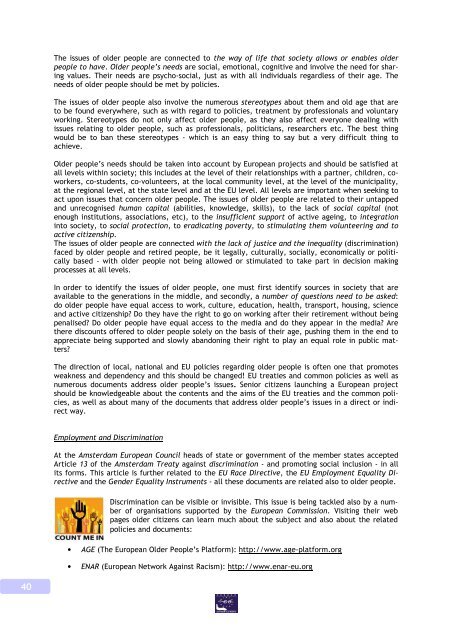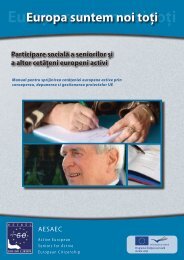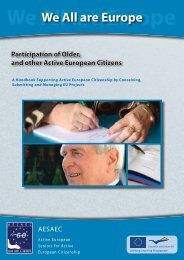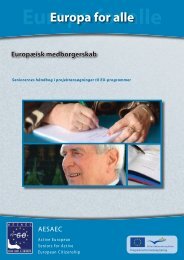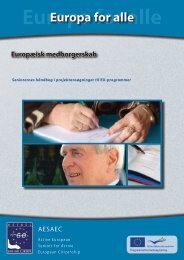We All are Europe - AESAEC
We All are Europe - AESAEC
We All are Europe - AESAEC
You also want an ePaper? Increase the reach of your titles
YUMPU automatically turns print PDFs into web optimized ePapers that Google loves.
The issues of older people <strong>are</strong> connected to the way of life that society allows or enables older<br />
people to have. Older people’s needs <strong>are</strong> social, emotional, cognitive and involve the need for sharing<br />
values. Their needs <strong>are</strong> psycho-social, just as with all individuals regardless of their age. The<br />
needs of older people should be met by policies.<br />
The issues of older people also involve the numerous stereotypes about them and old age that <strong>are</strong><br />
to be found everywhere, such as with regard to policies, treatment by professionals and voluntary<br />
working. Stereotypes do not only affect older people, as they also affect everyone dealing with<br />
issues relating to older people, such as professionals, politicians, researchers etc. The best thing<br />
would be to ban these stereotypes - which is an easy thing to say but a very difficult thing to<br />
achieve.<br />
Older people’s needs should be taken into account by <strong>Europe</strong>an projects and should be satisfied at<br />
all levels within society; this includes at the level of their relationships with a partner, children, coworkers,<br />
co-students, co-volunteers, at the local community level, at the level of the municipality,<br />
at the regional level, at the state level and at the EU level. <strong>All</strong> levels <strong>are</strong> important when seeking to<br />
act upon issues that concern older people. The issues of older people <strong>are</strong> related to their untapped<br />
and unrecognised human capital (abilities, knowledge, skills), to the lack of social capital (not<br />
enough institutions, associations, etc), to the insufficient support of active ageing, to integration<br />
into society, to social protection, to eradicating poverty, to stimulating them volunteering and to<br />
active citizenship.<br />
The issues of older people <strong>are</strong> connected with the lack of justice and the inequality (discrimination)<br />
faced by older people and retired people, be it legally, culturally, socially, economically or politically<br />
based - with older people not being allowed or stimulated to take part in decision making<br />
processes at all levels.<br />
In order to identify the issues of older people, one must first identify sources in society that <strong>are</strong><br />
available to the generations in the middle, and secondly, a number of questions need to be asked:<br />
do older people have equal access to work, culture, education, health, transport, housing, science<br />
and active citizenship Do they have the right to go on working after their retirement without being<br />
penalised Do older people have equal access to the media and do they appear in the media Are<br />
there discounts offered to older people solely on the basis of their age, pushing them in the end to<br />
appreciate being supported and slowly abandoning their right to play an equal role in public matters<br />
The direction of local, national and EU policies regarding older people is often one that promotes<br />
weakness and dependency and this should be changed! EU treaties and common policies as well as<br />
numerous documents address older people’s issues. Senior citizens launching a <strong>Europe</strong>an project<br />
should be knowledgeable about the contents and the aims of the EU treaties and the common policies,<br />
as well as about many of the documents that address older people’s issues in a direct or indirect<br />
way.<br />
Employment and Discrimination<br />
At the Amsterdam <strong>Europe</strong>an Council heads of state or government of the member states accepted<br />
Article 13 of the Amsterdam Treaty against discrimination - and promoting social inclusion - in all<br />
its forms. This article is further related to the EU Race Directive, the EU Employment Equality Directive<br />
and the Gender Equality Instruments - all these documents <strong>are</strong> related also to older people.<br />
Discrimination can be visible or invisible. This issue is being tackled also by a number<br />
of organisations supported by the <strong>Europe</strong>an Commission. Visiting their web<br />
pages older citizens can learn much about the subject and also about the related<br />
policies and documents:<br />
• AGE (The <strong>Europe</strong>an Older People’s Platform): http://www.age-platform.org<br />
• ENAR (<strong>Europe</strong>an Network Against Racism): http://www.enar-eu.org<br />
40


